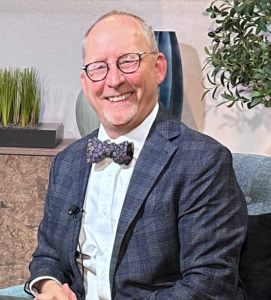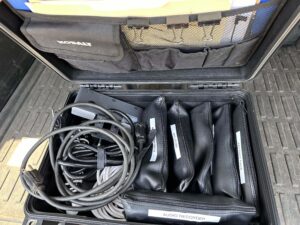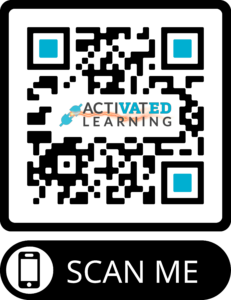Written by Tom Landon, the Director of Educational Innovation at Blue Ridge PBS
When I was a kid I thought one day I’d like to be a disk jockey at a radio station, but after graduating with a degree in telecommunications and getting my first job working the console from midnight to six a.m. at KFMU, an album rock station in Steamboat Springs, Colorado, I soon realized that the job was a lot less glamorous than I’d envisioned. It was a lot less like being Dr. Johnny Fever on WKRP in Cincinnati than I hoped (If you know, you know, and if you don’t, find an old episode of the show and watch it!) For one, it was pretty lonely sitting in a small soundproof room every night playing songs for the folks stocking shelves overnight at the Safeway, so I pivoted to video production, moving to Roanoke to work for a TV station and then an independent production company where I got to travel regularly, mostly producing ads and marketing videos for industrial clients, car dealers, and even cosmetic surgeons.
graduating with a degree in telecommunications and getting my first job working the console from midnight to six a.m. at KFMU, an album rock station in Steamboat Springs, Colorado, I soon realized that the job was a lot less glamorous than I’d envisioned. It was a lot less like being Dr. Johnny Fever on WKRP in Cincinnati than I hoped (If you know, you know, and if you don’t, find an old episode of the show and watch it!) For one, it was pretty lonely sitting in a small soundproof room every night playing songs for the folks stocking shelves overnight at the Safeway, so I pivoted to video production, moving to Roanoke to work for a TV station and then an independent production company where I got to travel regularly, mostly producing ads and marketing videos for industrial clients, car dealers, and even cosmetic surgeons.
When that company failed, and with the encouragement of my smart wife, I settled on teaching and went back to school to become a social studies teacher. It was the dawn of the computer age in education, and I quickly realized that my technical background was a huge benefit in the classroom. Since then I’ve had a varied career, working in education and media production. In 2021 I left Virtual Virginia where I’d been the Director of Instruction and returned to Blue Ridge PBS, where I’d had a summer internship in 1985 and been a K-12 Specialist from 2000-2007. My current job is a blend of production and education work, which is a perfect fit.
Last year I was part of a team from VSTE and VDOE that was tasked with creating a new podcast designed to put a spotlight on innovative uses of instructional technology while also elevating the profession of teaching. We spent several months deciding what we wanted the podcast to be, and in early December we recorded the first episode at the annual VSTE conference in Roanoke where we interviewed Blended Learning guru Dr. Catlin Tucker in front of more than a hundred attendees, and spent time recording short interviews with other folks in attendance. I can honestly say it’s been some of the most rewarding work of my career, and I’ve come to love the simplicity and intimacy that podcasts provide versus the complex nature of video production.
I had a lot of fun assembling a mobile podcast kit that holds an audio recorder, 4 microphones, mic stands, cables, and power cords. Because I work for a television station, I was able to source a lot of it from equipment at hand. It’s a little heavier than I’d like, and I’ll be making some modifications before we start on our second season, but overall it worked well.
mic stands, cables, and power cords. Because I work for a television station, I was able to source a lot of it from equipment at hand. It’s a little heavier than I’d like, and I’ll be making some modifications before we start on our second season, but overall it worked well.
This morning I edited the last episode of our 12 episode season. To record it I visited Suffolk Public Schools, where they host the SEAL Challenge, a collaboration with Penn State that allows kids to choose between submersible and land based robots and aerial drones to complete a highly complex task. The episode is emblematic of the series, which has featured award winning teachers, librarians who delivered books to students during the COVID summer using drones, a trailer converted to high tech lab in Washington County, and an ITRT who set up two Virtual Reality Labs in Bristol. Each episode is available by video on ECHO, a streaming channel of Blue ridge PBS focused on Education, Community, Health and Opportunity, as well as on the major podcast platforms like Apple Podcasts, Amazon Music, and Spotify.
So what did I learn this year? For one, that I missed the camaraderie and collaboration that comes with production work. The ActiVAtED Learning team provided great topics and guests and also gave me valuable feedback. I learned a ton of new technical skills. The podcast is recorded using a video camera synchronized to a 6 channel digital audio recorder. I edited the first season using Apple’s Final Cut Pro, but a coworker has convinced me to switch to a new application called Adobe Podcast for next year, so that’ll be another chance to build my technical skills. But probably the most important thing I learned was that I still love getting out of the office and meeting great educators. Now more than ever, teaching is hard, so I hope that ActiVAtED Learning accomplishes our goal of encouraging teachers not to give up - to look for new ways to stretch their brains and build their skillsets.

If you haven’t yet listened to ActiVAtED Learning, give it a listen and if you like it, please follow and review at least one episode. You can find all of the shows by going on our website at https://www.blueridgepbs.org/educational-resources/activated-learning/
If you’ve got an idea for an episode for season 2 or questions about the production process, drop me a line at activatedlearning@blueridgepbs.org. Happy listening!



